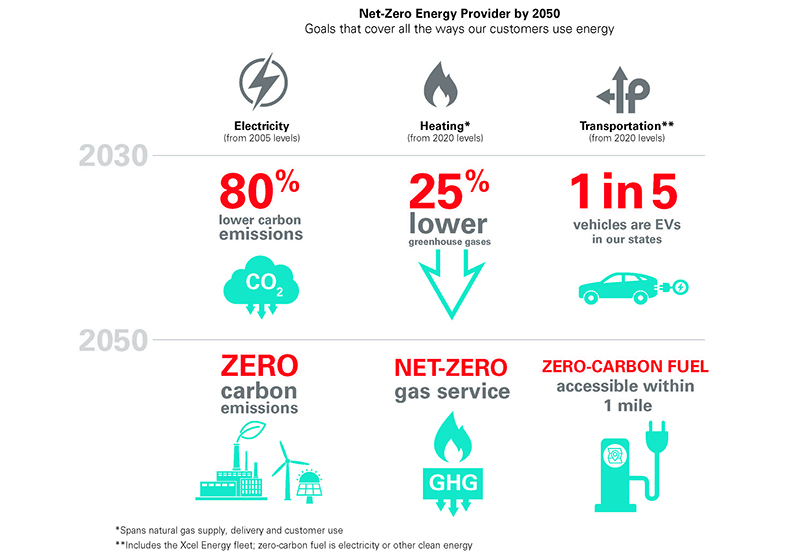Clean energy and electric vehicles highlight climate progress underway

Clean energy technologies and clean electric vehicles are being highlighted across the United States this week. Both will be crucial in readying America for an emissions-free future.
National Clean Energy Week is a celebration of the clean energy that powers daily lives while producing little or no greenhouse gas emissions, and the policies, industries and innovations that make it possible. And Drive Electric Week is a nationwide celebration to raise awareness of the many benefits of electric vehicles – whether for personal use, business or in communities.
In terms of clean energy, Xcel Energy aims to provide customers with net-zero energy by 2050, while continuing to provide customers reliable, secure and affordable energy. The company was the first major U.S. energy provider to set comprehensive environmental goals across all the ways its customers use energy – including electricity, heating and transportation – with an initial major commitment of cutting carbon emissions on the electric side by 80 percent by 2030.
The company is adopting clean resources today that can lower customer costs now and in the future. This includes adding more wind and solar energy to the grid, which produces electricity without fuel costs. For instance, from 2017 through 2021, its wind farms saved customers $1.8 billion in avoided fuel and tax credits. Xcel Energy also offers a far-reaching portfolio of conservation programs that help customers lower their bills, and its transportation programs make using electric vehicles more economical.
To reach its net-zero aspirations, Xcel Energy needs new affordable technologies for producing zero-carbon, always-available electricity, clean fuels and energy storage. It actively participates in industry and other collaborations that are accelerating the research, development and deployment of promising clean energy technologies.
Through new federal programs, the company plans to compete for funding to demonstrate emerging technologies, including long-duration storage and hydrogen production, at a reduced cost to customers. It also plans to use tax credits and other incentives to make clean resources like wind and solar power even more affordable, as well as expand customer options for energy efficiency and electric vehicles.
In terms of electric vehicles, Xcel Energy sees significant EV growth on the horizon, which will expand the company’s clean energy leadership to the transportation sector. This growth will allow for innovative programs to help customers make the transition in a way that delivers net benefits to both customers and communities. The company has set an aggressive goal to power one out of five vehicles with electricity in its eight-state service territory by the end of the decade.
“We know EV adoption will grow exponentially in the coming years, and we will be ready,” said Nadia El Mallakh, who leads Xcel Energy’s Clean Transportation team. “Our employees are working hard to make sure the transition to EVs is easy, seamless and less costly for our customers.”
From a regulatory and policy perspective, the company made significant strides last year – receiving final written approval for comprehensive, inaugural EV plans in Minnesota, Colorado and New Mexico. Colorado’s nation-leading $110 million Transportation Electrification Plan, for instance, provides charging equipment for both single-family and multi-family homes, and aligns with the state’s goal to help place 940,000 EVs on Colorado roads by 2030. Broad and innovative, these plans focus on residential and business customers, while also embracing tools to bring electrification to all customers.
As far as its own fleet, Xcel Energy now sports the industry’s first fully electric bucket trucks in the nation in Minnesota, with a second fully electric bucket truck scheduled to be delivered to Colorado by the end of the year. And it plans to purchase additional EV bucket trucks in the future after piloting and testing these first two trucks.
The company also has 10 fully electric Chevrolet Bolts in the fleet today, with several more on order and expected to be delivered by the end of the year. And it has three fully electric Ford F150 Lightning pickups in the fleet, with 15 more on order, as well as currently maintaining more than 140 hybrid passenger vehicles in the fleet today.
Find more information about all of Xcel Energy’s clean energy efforts here: Clean Energy Transition Progress | Net Zero Plan | Our Commitment | Xcel Energy



